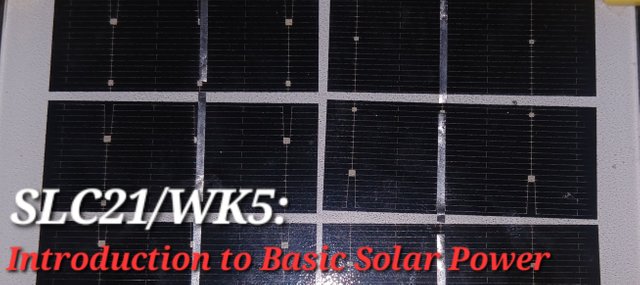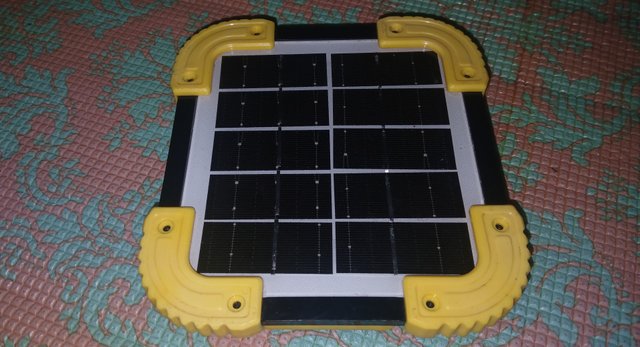SLC21/WK5: Introduction to Basic Solar Power

Welcome to another electrifying day on my blog! In this post I will be exploring energy with solar electricity as part of my participation in the Steemit learning challenge season 21.
What is solar electricity?
Photovoltaic power, which is popularly known as solar electricity, is a type of renewable form of electrical energy which harnesses the power from the brightness of the sun, it uses the sun's ray generate electricity that is clean and also green for homes and offices.
[A] Share your knowledge about solar power with us by reading our lesson.
A photovoltaic power supply uses the brightness of the sun to function. The units on the solar panel called photovoltaic cells are used to convert sunlight into electrical energy. These solar panels are made from special semiconductor materials. materials that would very easily let go of some electrons when they are exposed to any bright light with strong intensity. The movement of the freed electrons flowing through the electrical circuit, generating electricity.
Working principles
- Most of the Light from the sun is captured by the solar panels.
- The photovoltaic cells in the solar panels converts the incoming sunlight into energy.
- The acquired energy helps the semiconducting materials in the panel to release electrons.
- All released electrons are guided to flow through an electrical circuit; the flow creates a current that could be used or stored to be used later, when the sun is down.
- Some systems have cells that store the power; others have devices that convert the power to a form that is more appropriate for devices.
[B.] Write three important differences between AC solar and DC solar systems. (as learnt from our lesson)
| AC Solar | DC Solar |
|---|---|
| Requires an inverter to convert DC power to AC. | Uses the power directly without converting |
| AC solar is more expensive because it needs an inverter. | DC solar do not need inverter making it less expensive. |
| can be used with a lot of home appliances. | can only be used with a few DC-powered devices. |
| level of complexity is high | level of complexity is low in comparison |
[C.] Calculate your home's electrical load and share it with us. Follow our lesson as an example.
| Item | Qty | Unit | Total watt |
|---|---|---|---|
| Bosch Refrigerator | 1 | 0.4Kwh | 400 |
| Samsung | 1 | 0.49Kwh | 490 |
| 32" Samsung TV | 1 | 27w | 27 |
| Electric Bulb | 6 | 60watt | 360 |
| Security Bulb | 2 | 100watt | 200 |
| Rice Boiler | 1 | 700w | 700 |
| Standing Fan | 2 | 70watt | 140 |
| Total | 2,317watt | ||

[D.] Prepare a DC solar project specification for a customer's home to use four 5-watt lamps and three 20-watt fans.
| Item | Qty | Unit | Total watt |
|---|---|---|---|
| Electric Lamps | 4 | 5-watt | 20 |
| Electric Fan | 3 | 20-watt | 60 |
| Total wattage | 80 |
The total energy needed for this house is 80w.
Tolerance = 20% x 80 =16
80 + 16 = 96w approximately 100w
Specifications for a system that can run 48 hours on a 100w load
Specification for solar panel
| Solar Panel | |
|---|---|
| Type: | Monocrystalline |
| Power: | 300W |
| Voltage: | 24V |
| Current: | 12.5A |
| --- |
Specification for charge controller
| charge controller | |
|---|---|
| Type: | MPPT (Maximum Power Point Tracking) |
| input Voltage: | 150V - 250V DC |
| Output Voltage: | 24V DC |
| Output Current: | 40 - 60A |
| Efficiency: | 95% or higher |
| --- |
Specification for battery
| Battery | |
|---|---|
| Type: | Lithium-Ion (LiFePO4) |
| Capacity: | 250Ah |
| Voltage: | 24V DC |
| Depth of Discharge: | 50% or less |
| --- |
Operating with this specification, even at a load of 100w, the system will run 48 hours of uninterrupted power after a full charge
[E.] Prepare specifications for a customer's AC solar system to drive a water pump motor of 1 HP or 746 W and write the function of each device.
Here is a specification that can run this pump for 18 hours on one full charge.
Specification for solar panel array
| Solar Panel | |
|---|---|
| Quantity | 5 |
| Type: | Monocrystalline |
| Power: | 1500W |
| Voltage: | 24V |
| Current: | 62.5A |
| --- |
Specification for charge controller
| charge controller | |
|---|---|
| Type: | MPPT (Maximum Power Point Tracking) |
| input Voltage: | 150V - 250V DC |
| Output Voltage: | 24V DC |
| Output Current: | 40 - 60A |
| Efficiency: | 95% or higher |
| --- |
Specification for inverter
| Inverter | |
|---|---|
| Type: | Pure sine wave Inverter |
| Power: | 2000W |
| input Voltage: | 24V DC |
| Output Current: | 240V AC |
| Efficiency: | 95% or higher |
| --- |
Specification for battery
| Battery | |
|---|---|
| Type: | Lithium-Ion (LiFePO4) |
| Capacity: | 1200Ah |
| Voltage: | 24V DC |
| Depth of Discharge: | 50% or less |
| --- |
Thank you for this intresting lesson. I am so happey that I attepted it, now I know more about solar power, panels and batteries. Thanks to this lesson, I can now calculate some things, understand KvA and battery vh.
https://x.com/udyliciouz/status/1861362632466313674?t=6TCMjgh61zAe7X89FqPwSQ&s=19
Listrik tenaga surya lebih ramah lingkungan. Terimakasih banyak sudah membagikan konten berkualitas di platform steemit